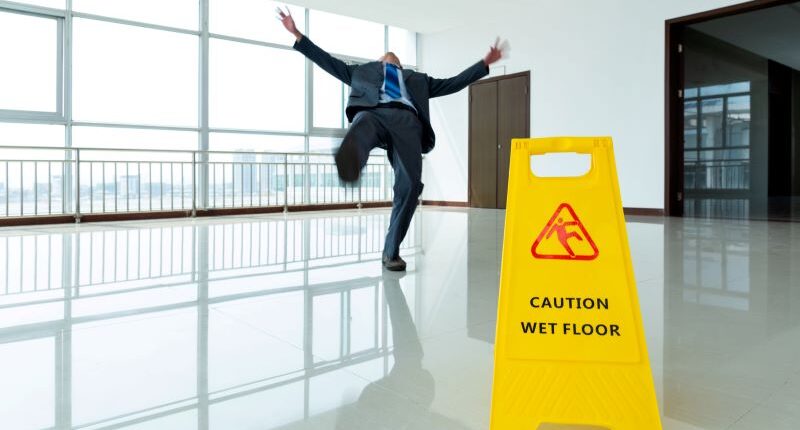Can You Sue for Slipping on a Wet Floor?

Nobody wakes up in the morning and plans on slipping on a wet floor, and nobody wants an injury impacting many different areas of their lives. However, if it happens to you, it’s important to know your legal options.
Continue reading for more information.
Introduction
Slipping and falling can result in a long, drawn-out legal battle that disrupts the lives of all involved. Nonetheless, anyone can slip and fall. And the resulting injury can be something simple that disappears in a day or so – or it can be life-changing.
If you find yourself here, know your rights. Can you sue for slipping on a wet floor? Let’s find out.
Most Common Slip and Fall Injuries
Slip and fall accidents can lead to many different types of injuries. This will depend on the individual falling, where it occurred, how it happened, and so forth. However, a few of the most common injuries that stem from this include:
- Broken bones
- Concussions
- Neck injuries
- Various forms of Traumatic Brain Injuries (TBIs)
- Facial injuries
- Knee injuries
- Ankle injuries
- Shoulder injuries
- Elbow injuries
- Wrist injuries
- Chronic pain
- Broken teeth
- Broken pelvis
Every individual is different – and the injuries they suffer will be different, too.
California’s Wet Floor Sign Law
Slips and falls can happen for all types of reasons, but when the floor is wet – the probability of someone taking a tumble increases significantly. Whether or not the area is visibly marked can be a significant factor.
Contrary to popular belief, no law in California requires property owners or business owners to place a “wet floor” sign on their property when the floor is wet. The state does not require it. Yes, it is common to see them in these situations, but it is usually just a precaution taken by the responsible individual.
If a sign is up and someone falls on a wet floor, you may have trouble proving that the party was negligent. Only an experienced personal injury attorney can go over these details to determine whether you have a case.
Filing Your Claim – or Lawsuit
In California, you can claim damages if you suffered injuries. This can help you recover any out-of-pocket costs you encountered and be compensated for any injuries or other damages.
But who can you file a claim against? It depends on where the fall took place.
If the fall happened in a commercial location, such as a business or retail store, you could file your claim against their commercial liability insurance coverage.
If the fall happened in a private residence, such as a neighbor’s house, you could file your claim against their homeowner’s insurance policy.
Or, you could file a personal injury lawsuit against the property owner or whoever is at fault for the conditions that led to the injury. Working with an attorney can help you determine the best route to take so that you can get the compensation you deserve.
Proving Your Case
A couple of boxes need to be checked to prove that a specific individual or company is responsible for an injury resulting from slipping on a wet floor. Take a look at the following:
- A dangerous condition resulting from the owner not correctly maintaining the property caused the fall.
- The owner knew there was a potentially dangerous issue and failed to rectify it.
- A reasonable property owner or business owner would have recognized and fixed the dangerous situation but failed to do so.
The property owner or business owner can be held liable in each of these situations. Of course, knowing some additional information can be beneficial, too, such as:
- How long was the floor wet?
- What made the floor wet?
- Was anyone around to witness your fall?
- Were any warning signs posted?
Damages Due to Slipping on a Wet Floor
If you slip on a wet floor and are injured, you may face many life changes – and mounting medical bills. Many of these things can be included in your injury claim so that you can obtain damages. A few of these compensatory damages are:
- Medical bills, including emergency care, hospital stays, doctor follow-ups, physical therapy, and more.
- Lost wages
- Loss of ability to work or reduction of wages in the future due to permanent disability
- Pain and suffering
- Scarring and disfigurement
Depending on the case, you may also seek punitive damages. Unlike the above damages that compensate you for your injuries – or, in other words, what is owed to you – punitive damages are meant to be a punishment for the one who was neglectful.
Statute of Limitations
There is a statute of limitations in California regarding slip and fall injuries. According to the California Code of Civil Procedure, section 335.1, you have two (2) years from the date of the slip and fall to file a compensation claim.
More specifically, this statute reads:
CHAPTER 3. The Time of Commencing Actions Other Than for the Recovery of Real Property [335 – 349.4] ( Chapter 3 enacted 1872. )
335.1 “Within two years: An action for assault, battery, or injury to, or the death of, an individual caused by the wrongful act or neglect of another.”
While you may still have some rights to compensation after the statute of limitations is up, it isn’t likely. So, to ensure you have the best chance, act swiftly.
The Wrap Up
If you have been injured in a slip and fall due to a wet floor, whether on personal or commercial property, you may have an opportunity to receive compensation. But this is never something you want to do alone.
Take the time to find an experienced personal injury attorney and discuss the details of your case. Determine whether there is enough evidence to proceed with a claim and the best way.
Of course, you can always try to handle your case. But, if you want compensation for your injuries, you will want an expert.
Are you in search for a certified attorney to represent you?
Let us help you find one today!

